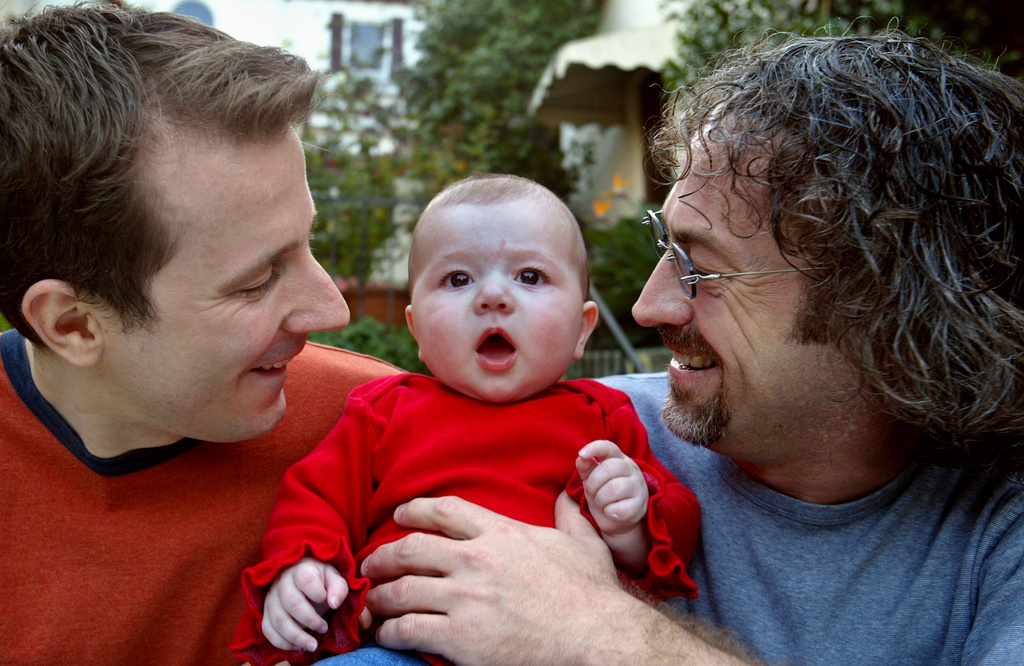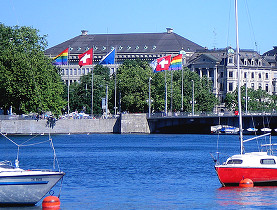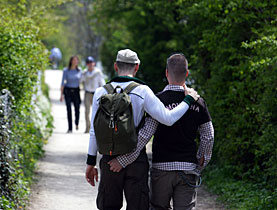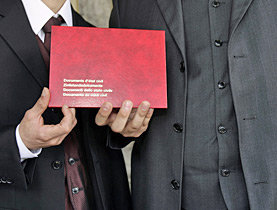Switzerland needs to “catch up” on gay adoption

Switzerland is behind the times and other countries when it comes to gay adoption rights, campaigner Moël Volken tells swissinfo.ch.
Volken is spokesman for the Family Chances association which has just handed in a petition to parliament calling for gay couples to be granted the same adoption rights as heterosexual married ones.
He says around 6,000 children are part of rainbow families. But currently gay couples in registered partnerships are not allowed to adopt a child, nor is one partner allowed to adopt the child of the other.
The petition, which calls for a change to the law and attracted 19,390 signatures, will now be considered by a parliamentary committee.
swissinfo.ch: How would the law change work in practice?
Moël Volken: For instance, a friend of mine a woman has a baby. She asked me to take care of the child if she died. Now the situation is the following: if she dies, I can adopt a child on the condition that I don’t register my partnership. If I have registered my partnership, I would have to dissolve it first. This doesn’t help anybody and is a disadvantage for the child.
In our committee we have a couple, both women, who each have a child. They are registered partners and would like to be the parents of both children, but at present this is not possible. That means if one of them dies, one of the children would be without parents. The child has no guarantee that he or she can continue to grow up with her brother and her [other] mother because the law doesn’t recognise [registered partners] as parents, they are considered strangers.
When people talk about gay couples, rainbow families, and adoption they always think of a male couple who go somewhere and obtain a child. That’s not the aim of the petition.
swissinfo.ch: So the idea is to regulate this existing situation and to give more equality to registered partnerships?
M.V.: To give children growing up in registered partnership the same chances as children growing up in married couples. There wouldn’t be a big number of these kind of adoptions a year, around ten-20. It’s always the same scenario – if only a few people don’t have the right without any reason, then you have to change the situation.
swissinfo.ch: How does the situation in Switzerland compare with other countries?
M.V.: I love the example of Spain. Spain, in the same month as the Swiss adopted the registered partnership law, allowed gay marriage and two weeks later the law, [including the right to adopt] entered into force.
In Switzerland we had not really marriage, but something smaller, with the express exclusion of adoption and it took two years to come into force. I compare the situation with women’s voting rights when we were 50 years later [than everyone else] and it seems that Switzerland likes to repeat the same story with same sex couples and their children.
If you look at Britain, Sweden and the Netherlands, most countries of comparable culture in Europe have adopted a gay adoption law as well as Spain, one of the Mediterranean countries which usually keep more distance to same sex couples. In Switzerland, the big parties, the Christian Democrats and the Radicals, don’t dare to touch the subject. They prefer to look away.
swissinfo.ch: A survey commissioned by gay groups found a majority of the population in support of gay adoption in Switzerland.
M.V.: The result was that 86.3 per cent agreed that the legal situation in Switzerland ought to be changed in favour of rainbow families, and that’s incredible. And even 53 per cent declared themselves favourable to or completely for adoption rights.
swissinfo.ch: Is this a change of attitude?
M.V.: Yes, because the last numbers I saw were from 2001 or 2002 with 36 per cent for adoption. Registered partnerships is one reason for the change and the other is that the Swiss media has reported widely in the past three year on rainbow families and gay adoptions … they were quicker than us in the Swiss gay movement in dealing with the subject.
swissinfo.ch: There is some opposition to the petition. The Protestant Party has issued a statement saying that every child has a right to a mother and a father.
M.V.: I don’t know how a child could have a right to a mother and father. If it was really a right then I would say, for example, you have to prohibit divorce. It’s a reality that there are many children who grow up for some reason only with only one parent or in a patchwork family… We should ensure that every child finds a safe, good place and this could also be with a same-sex couple.
swissinfo.ch: The party also claimed that gay adoption could be harmful for children’s development.
M.V.: I agree with them that usually it is best for the child is to grow up with its biological parents but I come back to my point, what do you do in the event of divorce or accident, and what about children adopted by heterosexual couples, they also grow up without biological parents?…
The most important thing is that the people who care for children really love them… and there are different scientific studies that say the sexual composition of the couple a child grows up with doesn’t play an important role.
Isobel Leybold-Johnson, swissinfo.ch
An estimated 6,000 children are growing up with gay parents in Switzerland, most of them with two mothers.
Almost half the children come from earlier, heterosexual relationships. The others were born into rainbow families through fertility treatments or an agreement involving lesbian women and heterosexual or homosexual male friends.
Moël Volken expects that a change to the adoption law would only result in 10-20 adoptions a year by gap couples.
It calls for:
Equality between same sex couples and married couples in terms of parental rights and adoption.
The same legal equality for children growing up in a registered partnership as for children growing up with a married couple.
An adoption law that takes into consideration the interests and wellbeing of the child rather than the civil status and sexual orientation of the person or couple wanting to adopt.
It will now be considered by a parliamentary committee. It may decide just to “take note” of it and the process would stop there, Moël Volken says. Or it will be recommended for discussion in parliament. Two parliamentarians are also filing a motion on the issue.
The petition organisers have left it up to parliament to decide how the issue should be addressed.

In compliance with the JTI standards
More: SWI swissinfo.ch certified by the Journalism Trust Initiative




You can find an overview of ongoing debates with our journalists here. Please join us!
If you want to start a conversation about a topic raised in this article or want to report factual errors, email us at english@swissinfo.ch.